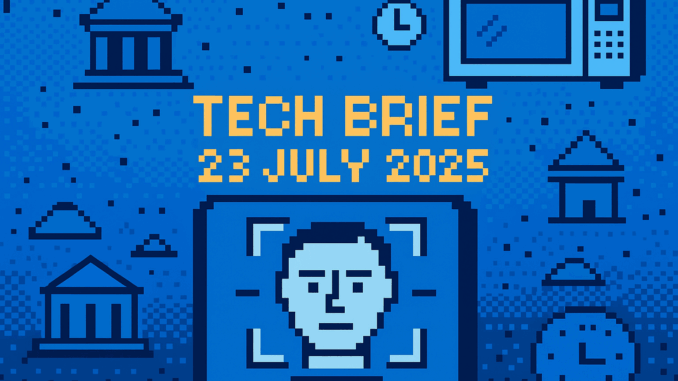
We’ve all stood by the kettle, waiting for the familiar click, or watched a progress bar crawl across the screen, small rituals that shape our digital days. Tech Brief 23 July 2025 brings stories where technology quietly redefines policy, finance, and even our tea breaks. Missed yesterday’s Tech Brief? Catch up here before diving in.
UK Border Officials Trial AI for Asylum Seeker Age Checks
Picture this: a border official squints at a passport, then at a young face, trying to decide if the person before them is a child or an adult. The UK government is now piloting AI facial analysis to estimate the ages of asylum seekers claiming to be children. This technology is supposed to address flaws in manual age assessments, but accuracy and ethics remain hotly debated. The Home Office confirmed the rollout, which marks a significant step toward automated border management in Britain. AI facial recognition systems, once an idea for science fiction, are now making decisions that affect real lives. It’s a leap that would have astonished early biometric pioneers like Woodrow Bledsoe, whose 1960s face-matching experiments laid the groundwork for today’s algorithms. As government automation expands, public oversight becomes even more vital. The balance between efficiency and fairness has never mattered more.
Bank of England Completes Quiet Overhaul of Core Systems
The Bank of England just finished a generational upgrade of its core financial systems, and most of us barely noticed. This massive project replaced the backbone of British banking while keeping payments, transfers, and daily transactions running smoothly. For the engineers behind the scenes, it was as seamless as swapping out the engine of a moving train. The original Big Bang of 1986 was a public spectacle, but this time, stability took priority over showmanship. Over the decades, British banking has moved from mainframes and paper ledgers to digital platforms and cloud redundancy. The Bank’s approach reflects a distinctly British pragmatism, favouring continuity and resilience above all else. For customers, the result is improved reliability and future-proofing, even if most people never glimpse the wires and code that keep the system humming.
Microwaved Tea Becomes the New Digital Ritual
More of us are reaching for the microwave instead of the kettle for our daily brew, a shift that unsettles traditionalists and sparks debate at kitchen tables everywhere. Analysts point to shrinking kitchen spaces and a culture of instant gratification as key drivers of this change. The ritual of waiting for the kettle to boil has long been part of British life, just like the whirr of a cassette loading on a classic home computer. Now, with digital convenience reshaping our habits, some rituals are being reimagined or replaced entirely. While many argue that microwaved tea compromises taste, others value speed and simplicity. This trend highlights how technology, even in the kitchen, continues to reshape shared habits and cultural identity. What’s the digital ritual you refuse to give up, or the one you never thought you’d embrace? Share your story below.
Police and MI5 Surveillance of BBC Journalists Investigated
Fresh allegations have emerged about police and MI5 surveillance of BBC journalists between 2006 and 2022. The Investigatory Powers Tribunal is now reviewing claims that phone monitoring targeted reporters investigating state wrongdoing. Chris Moore’s case brings renewed attention to the balance between national security and press freedom. Surveillance technology has evolved rapidly since the days of analogue wiretaps, with digital monitoring now leaving far fewer traces. Over the decades, journalists have adapted to each new threat, relying on everything from payphones to encrypted messaging apps. The current investigation tests the limits of UK transparency laws and highlights the ongoing tension between investigative reporting and state oversight. For the media, vigilance remains essential in an era of pervasive digital surveillance.
From the Wayback Machine
On This Day: 1930 – Daniel D. McCracken, a pioneer in computer science education, was born. His textbooks on Fortran, BASIC, and assembly language made programming accessible to generations of students and scientists. With step-by-step guides and practical exercises, McCracken transformed coding from a specialist’s art into a skill anyone could learn. His legacy continues in today’s digital classrooms and online tutorials, where clear, structured learning is still the gold standard.
What This Means
Tech Brief 23 July 2025 shows how technology shapes policy, finance, and even our tea rituals. As systems evolve, so do the questions we ask about ethics, identity, and inclusion. Tech Brief 23 July 2025 invites all of us to reflect on how small changes can ripple through culture and community.
Stay curious, keep it analogue where it counts, and never underestimate the power of a good manual or a proper brew.
Missed yesterday’s Tech Brief? Catch up here.

Leave a Reply